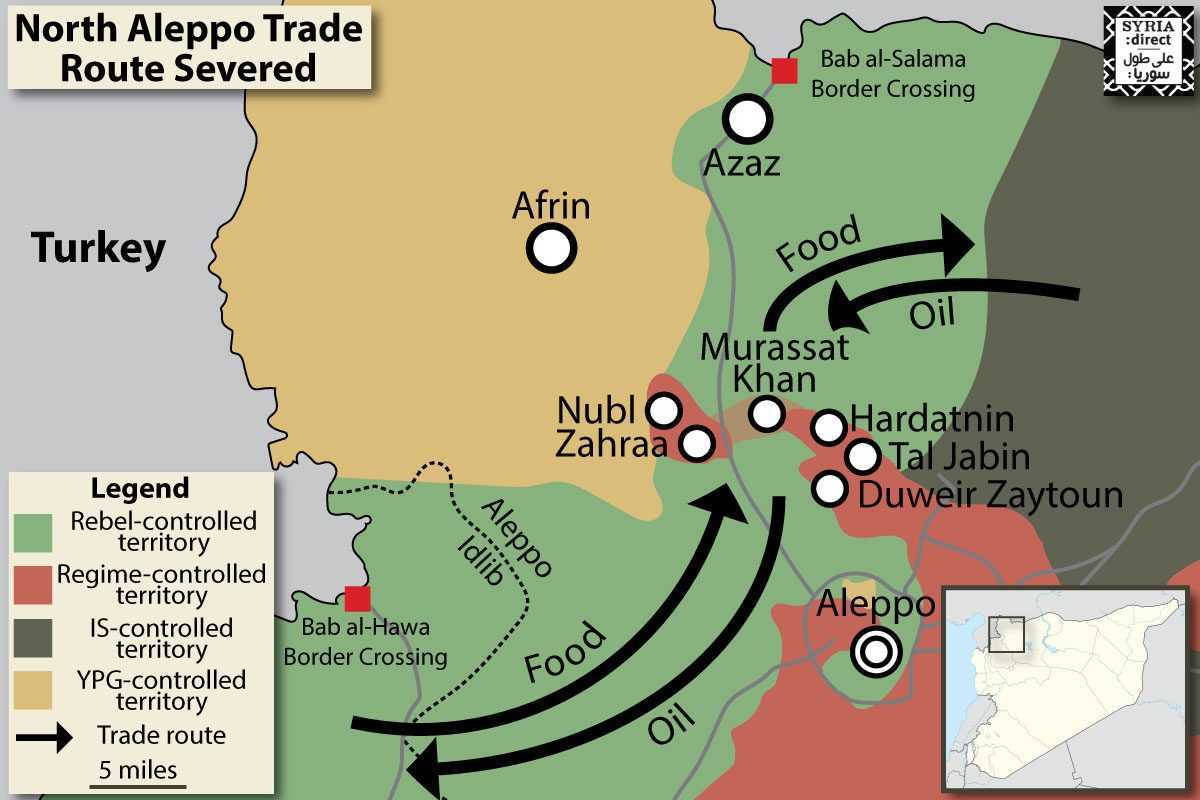Idlib ‘on the verge of a catastrophe’ as regime severs vital supply route, and with it, cuts off fuel access
AMMAN: Regime forces reportedly broke through the nearly four-year rebel […]
3 February 2016
AMMAN: Regime forces reportedly broke through the nearly four-year rebel siege on Nubl and Zahraa in northwestern Aleppo province Wednesday, effectively severing Idlib’s oil supply and portending a humanitarian “catastrophe” in the rebel-held province.
Late Wednesday, regime ground forces supported by heavy Russian air cover reached the encircled, Shiite-majority towns, reported pro-regime media. “Army units operating in the north Aleppo countryside, in collaboration with National Defense Forces, broke the siege on the towns of Nubl and Zahraa by terrorist groups,” reported state media agency SANA on Wednesday.
Syria Direct could not independently confirm whether regime forces had made it through rebel lines to the two towns, pro-regime islands besieged for almost four years by Victory Army rebels.
The potential breakthrough follows a series of lightning regime advances since Sunday to link up its forces north of Aleppo city with Nubl and Zahraa, located approximately 20km northwest of the provincial capital, and ultimately cut off Victory Army rebels in Idlib from rebel positions in the northern Aleppo countryside.
Moving from the east toward Nubl and Zahraa, regime forces earlier this week grabbed a series of three villages a few kilometers east of the besieged towns. The three villages lie in a rebel-held sliver of elevated land stretching approximately a dozen kilometers wide.
Now, from this newly captured high ground, regime troops can fire on “anything that moves” within this corridor, namely, merchants moving fuel and food back and forth as agreed upon by Idlib rebels and the Islamic State.
The informal trade route runs from Islamic State territory northeast of Aleppo city into rebel-held areas in western Aleppo and Idlib. In June, Victory Army rebels in the northern Aleppo countryside reached an agreement with IS to “keep the road open” for merchants travelling between rebel-held and Islamic State territory, according to a statement by the Victory Army in Aleppo.
The Victory Army benefits from the arrangement by maintaining an ongoing source of fuel for Syrians living in areas under its control, while IS receives food supplies.
If fuel stops flowing to Idlib the regime will have accomplished one of its long-term goals in northern Syria according to Rida al-Basha, a correspondent with pro-regime al-Mayadeen news, who offered Syria Direct his take on the regime’s strategy in January.
“Idlib is now a priority for the Syrian army…separating Idlib and isolating it totally, then liberating it.”
A military and humanitarian ‘catastrophe’
Journalists living in rebel-held Idlib and Aleppo provinces say that electricity, bread ovens, transportation, and other essential services that rely on fuel from Islamic State territory will grind to a halt without fuel.
Idlib province, controlled almost entirely by a coalition of Islamist rebels led by Jabhat a-Nusra, is dependent on fuel-driven generators. A fuel crisis would cause a humanitarian and military “catastrophe” in the northwestern province, opposition journalists tell Syria Direct.
Prior to the diesel-for-food agreement last June, Idlib province experienced a fuel shortage that led residents to demand that rebel factions open trade routes with IS, pro-opposition All4Syria reported in early June.
Wednesday’s regime gains north of Aleppo cut off these very trade routes, meaning that any fuel that reaches Idlib province will have to come through Turkey via the Bab al-Hawa crossing in northern Idlib.
Reliance on Turkey has its drawbacks, says one local journalist.
“Turkey did not allow fuel to enter Idlib province during last year’s fuel crisis,” says Hani al-Halal, a correspondent with the opposition Shaam News Network in Idlib. The province’s residents have few options other than to hope that “one of the Gulf countries supportive of the opposition will step up to provide fuel.”
But if the regime continues its advance and captures Bab al-Hawa, an endgame described to Syria Direct by pro-regime correspondent al-Basha, Idlib would be totally isolated from the Turkish border.
“The cutting off of fuel will obviously have a dire impact on rebel militias [in Idlib] who need to operate a large number of military vehicles,” said Muhammad Najm a-Din, a correspondent with pro-opposition Smart News currently in the northern Aleppo countryside.
Already, oil prices in Idlib have spiked as merchants have begun hoarding fuel stockpiles, a correspondent with pro-opposition Idlib News Network told Syria Direct Wednesday.
“If the regime continues to cut off the northern Aleppo countryside from the rest of the rebel-controlled areas [in Idlib], then there will be huge consequences, including the cutoff of electricity since we rely on petrol-driven generators,” said Mustafa Qantar.
Food will continue to arrive from Turkey via the Bab al-Howa border crossing for now, but merchants will sell them at inflated prices due to the increase in transportation costs, said Qantar.
Because Idlib is so densely populated, the affects of an impending fuel shortage means the province is “on the verge of a catastrophe,” concludes Qantar.








